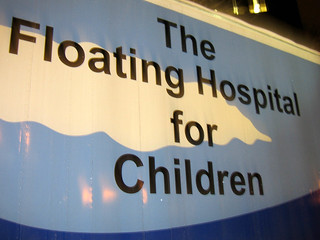In the 19th century, medicine was primarily concerned with adult health; managing symptoms and trialing various treatments. The health of children was treated in much more of a “c’est la vie” manner: kids would get sick, and hopefully they would get better [3]. This was until 1894, when the Floating Hospital for Children was established in Boston Harbor. This hospital ship took ill children and their mothers out for “fresh sea air” and were attended to by volunteer nurses and physicians. This floating hospital grew, upgraded, and eventually became Tufts Children’s Hospital [4]. Its legacy and history is one of advocacy for the health of children, a pioneer in pediatrics. The hospital-ship-turned medical-center became a hub of innovation and research, being the first to fabricate artificial milk for infants – Similac [7]. The idea of caring for children was born out of a culture of ignoring their needs, and it has shined for over a century as a champion of pediatrics. So why then, in 2022, are we allowing the ship to sink?
It was announced earlier this month that Tufts Medical Center will be closing its children’s hospital by July of this year. The children’s hospital often operates between 50-75% capacity (comparable to the usual bed utilization of Phoenix Children’s Hospital [5]), the CEO of Tufts, Michael Tarnoff, claims that even before the COVID-19 pandemic that the Boston community requires more specialized beds for adult care [2].
Pediatricians and public health experts are lamenting the closure of Tufts Children’s [1]. They claim that the decision is driven by financial motivations, admitting that pediatric patients are not as profitable for a hospital system as adult patients are. This is reflected by the fact that of the 50 hospitals with the most revenue in the US, only 2 of them are children’s hospitals [6].
The coincidence should not be lost on us that this medical center being closed is reminiscent of the very culture of apathy towards children’s health that necessitated its creation in the first place.
The plan is to redirect patients who would have been admitted to Tufts Childrens to Boston Children’s Hospital – a hospital that is currently operating between 80% to over 90% capacity [5]. The situation in Boston represents a plan that is deleterious to the children of the community, seemingly in the name of generating greater revenue for the company that owns Tufts, Wellforce. It is likely that Boston Children’s will also suffer due to this closure, pushing it beyond its capacity. As we have seen already throughout this pandemic, general hospitals pushed beyond their capabilities can lead to negative patient outcomes and healthcare worker burnout. This could be mirrored in the Boston community in the children’s hospital, now that Tufts will be closing. As pointed out by many critics of the closure, children’s mental health has been declared an emergency by the American Academy of Pediatrics, which the healthcare community in Boston will be less capable of addressing with the loss of a major pediatric medical center.
There has been great upset in the community, both of healthcare and lay people, in response to Tufts closing the legacy on the once Floating Hospital. The effects on children’s health remain to be seen, but reason would stand to believe that many will suffer with less access to care. It cannot be denied that the COVID-19 pandemic has increased the need for adult care, but should it come at the expense of our ability to care for our children? More than that, can we trust the stated intent, when the financial incentive is so poorly veiled?
The Floating Hospital for Children, the legacy of Tufts, was born out of a need to care for children, with no regard to cost. It seems that this ship will sink, with revenue and profits on the mind.
References
1. Pediatric doctors speak out against Tufts Children’s Hospital closure. Boston.com. https://www.boston.com/news/health/2022/01/23/pediatric-doctors-speak-out-against-tufts-childrens-hospital-closure/. Published 2022. Accessed January 27, 2022.
2. Tufts Medical Center plans to close its children’s hospital. News. https://www.wgbh.org/news/local-news/2022/01/20/tufts-medical-center-plans-to-close-its-childrens-hospital. Published 2022. Accessed January 27, 2022.
3. How A Harbor Barge Changed Pediatric Medicine. Lowell Institute. https://forum-network.org/lectures/how-harbor-barge-changed-pediatric-medicine/. Published 2022. Accessed January 27, 2022.
4. Floating Hospital renamed Tufts Children’s Hospital | Tufts Children’s Hospital. Tuftsmedicalcenter.org. https://www.tuftsmedicalcenter.org/news-events-media/press-releases/2020/floating-hospital-for-children-renamed-tufts-childrens-hospital. Published 2022. Accessed January 27, 2022.
5. COVID-19 Hospital Capacity. https://data.rgj.com/covid-19-hospital-capacity/facility/phoenix-childrens-hospital/033302/. Published 2022. Accessed January 27, 2022.
6. Top 50 Hospitals by Net Patient Revenue. Definitive Healthcare. https://www.definitivehc.com/resources/healthcare-insights/top-50-hospitals-by-net-patient-revenue. Published 2022. Accessed January 27, 2022.
7. History of Tufts Children’s Hospital at Tufts Medical Center Boston. Tuftschildrenshospital.org. https://www.tuftschildrenshospital.org/about-us/history. Published 2022. Accessed January 27, 2022.
Chris Laube is a student in the class of 2023. He was an EMT prior to med school, where he met his wife, and attended most community colleges in the Phoenix area as well as ASU. When not on rotations, he enjoys spending time with his wife and kids, pretending to be an endurance athlete, and video games.

